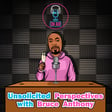
The Global Loneliness Crisis & Gen Z Pet Peeves
Loneliness, Gen Z culture clashes, and hilarious Amazon fails-this episode of Unsolicited Perspectives delivers it all! Experience the real, the raw, and the ridiculously funny in this episode of Unsolicited Perspectives! Hosts Bruce Anthony and his sister J. Aundrea crack open Sibling Happy Hour with a cocktail of spicy takes and unfiltered sibling banter that dives deep into today’s most relatable struggles. From the silent epidemic of loneliness sweeping across generations to the unique ways Gen Z draws conversational boundaries, Bruce and J. Aundrea don’t hold back.
You’ll laugh out loud as they share their most embarrassing Amazon fails-including drunken late-night orders that went hilariously wrong-and swap stories about social mishaps, family dynamics, and the awkward moments that make life memorable. The episode also tackles how technology, pop culture, and shifting generational values are shaping the way we connect-or disconnect-in modern society.
Whether you’re a Millennial feeling the sting of isolation, a Gen Z’er navigating new social rules, or just love a good story with a side of humor, this episode delivers insights, empathy, and entertainment in equal measure. #lonelinessepidemic #GenZ #amazon #mentalhealthmatters #digitalage #unsolicitedperspectives
🔔 Hit that subscribe and notification button for weekly content that bridges the past to the future with passion and perspective. Thumbs up if we’re hitting the right notes! Let’s get the conversation rolling—drop a comment and let’s chat about today’s topics.
For the real deal, uncensored and all, swing by our Patreon at patreon.com/unsolicitedperspectives for exclusive episodes and more.
Thank you for tuning into Unsolicited Perspectives with Bruce Anthony. Let's continue the conversation in the comments and remember, stay engaged, stay informed, and always keep an open mind. See you in the next episode!
#podcast #mentalhealth #relationships #currentevents #popculture #fyp #trending #SocialCommentary
Chapters:
00:00 Welcome to Unsolicited Perspectives 🎙️🔥💥
01:13 Sibling Happy Hour: Spicy Takes & Drinks 🍹🌶️
03:28 iPhone Disasters & Drunken Amazon Fails 📱🤦♂️
16:43 Loneliness Crisis EXPOSED: Why Half of Us Feel Isolated 😢🌍
21:42 Heart vs. Brain: The Hidden Health Toll of Feeling Alone 💔⚕️
25:36 The Hidden $154 Billion Problem: How Loneliness is Draining America 💸📉
27:39 Why We’re Still Lonely in a ‘Connected’ World'📲❌
30:51 Lockdowns vs. Loneliness: Did We Sacrifice Mental Health? 🏠😷
32:29 Tech Trap: Screens Stealing Real-Life Friendship 📱👥
35:36 Southern Struggles: Why Poverty & Loneliness Go Hand in Hand 🌎🏚️
39:32 Survival 101: Why Human Connection is as Vital as Food & Water ❤️💧
46:53 Gen Z Pet Peeves: Phrases That Make Them Cringe 🚫🗣️
56:43 Career Rebellion: Why Your 9-to-5 is SO Last Century! 💼🚀
01:05:10 Mic Drop Finale: Last Laughs & Parting Wisdom” 🎤✨
Follow the Audio Podcast:
Apple Podcast: https://podcasts.apple.com/us/podcast/unsolicited-perspectives/id1653664166?mt=2&ls=1
Spotify: https://open.spotify.com/show/32BCYx7YltZYsW9gTe9dtd
www.unsolictedperspectives.com
Beat Provided By https://freebeats.io
Produced By White Hot
